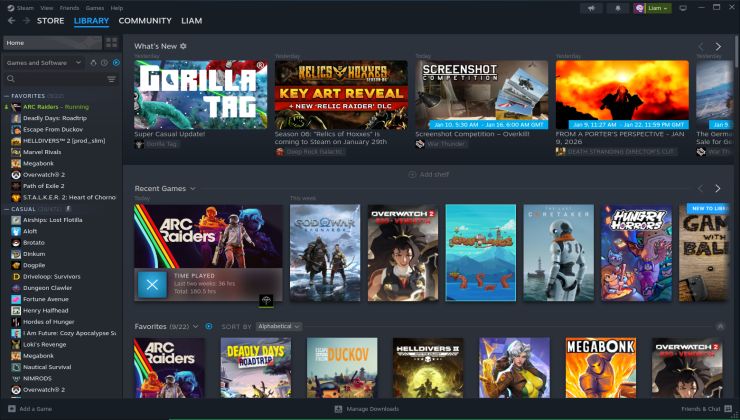After a string of annoying incidents after updates causing stability problems on Fedora, there's a new proposal put forward to help improve things.
The new proposal suggests forming a Special Interest Group (SIG) focused on developing a "recommended stream of work to improve our stability and robustness, and to improve our communication with users when problems arise that compromise that stability and robustness".
In the proposal several major update issues are noted that have come up lately including a recent Mesa update that broke launching games from Steam. I only switched to Fedora KDE a few days ago, and was bitten by the Mesa update, and so I was forced into the terminal to downgrade my Mesa version just to get gaming with friends that evening - something that ideally just shouldn't happen.
The chatter on the Fedora Discourse forum around the Mesa update got a little spicy, with the maintainer who actually pushed out this particular Mesa update noting they "don’t consider closed source steam a reliable indicator of issues, it has no debug symbols" which was pretty unhelpful. And later saying "Not my problem anymore, I have quit as rpmfusion admin".
Seems like the proposal is a good idea, at least to get the ball rolling on things. Their update process currently doesn't seem to work particularly well at times. This isn't about playing a blame game as issues happen of course, but so many issues could be avoided with better processes in place. A system cannot be (as the Fedora websites advertises) "Trusted, powerful and easy" and "Reliable" if updates repeatedly break major parts of the system.
Hopefully some good improvements can come out of this.
My daughter and I wanted to watch a movie the other day. Apparently, the Mesa update was causing stuttering when watching the movie with VLC or any other video player.
I rebooted the PC into Steam OS so I could watch the movie smoothly without any issues. Later, I removed Fedora and installed Debian instead...
Rolling-release or semi-rolling-release packages often cause far too many problems for end users because they release new packages without even bothering to test them ;-(
Personally, I refuse to be treated like a beta tester of buggy software solutions. If you're leaving Windows, it's not to encounter the same instability problems under Linux... ;-(
Having a special interest group for stability sounds like a good idea though. Ubuntu has a lot of design choices I don't agree with, Mint and Debian don't update quick enough and GarudArch is too unstable for my daily driver, but Fedora's got a good balance of stability and new packages without having a load of Ubuntuisms that I don't really agree with.
Between the AI and the 32-bit fiasco I've kind of been losing trust in Fedora, but I do want to stick with them if I can. If I do end up distrohopping again however then I'm probably off to Debian land. The more I use that distro on my teritiary older computer, the more I find myself liking it.
It has multiple people saying it was broken, and was still pushed out.
Turns out, laziness in updating pays !:woot:
Rolling-release or semi-rolling-release packages often cause far too many problems for end users because they release new packages without even bothering to test them ;-(Btw it is common practice to only update to Nth release of Fedora when N+1th release comes out (so you should stay on 42 until 44 is out, then update to 43), and this is what ublue does by default iirc, their default recommended download is always one version behind Fedora. On the other hand, because Fedora is semi-rolling, I'm not really sure how effective this is, but it probably is, since people do that.
Last edited by rustynail on 26 Nov 2025 at 3:09 pm UTC
Quoting: phil995511Rolling-release or semi-rolling-release packages often cause far too many problems for end users because they release new packages without even bothering to test them ;-(Well, openSUSE Tumbleweed is a rolling release distro and this is not true for them.
Personally, I refuse to be treated like a beta tester of buggy software solutions. If you're leaving Windows, it's not to encounter the same instability problems under Linux... ;-(
Is very common for they to delay updates for days or weeks when they detect that something is not ready.
Most of times, after some big updates for very common used things (like desktop environment, MESA, and etc.) you can find the latest version on Arch Linux and even on Fedora since the day one, but for Tumbleweed you need to wait a day or two because of the tests.
You can find the latest version on Arch Linux and even on Fedora since the day oneStrictly speaking, both Fedora and Arch have their own testing repos that everything goes through for a while and they delay things too, but it doesn't necessarily save you from everything. Same as Debian didn't save me when LTS kernel suddenly had regressions when it wasn't even new anymore, but the probability of that on Debian is much lower of course
It very much reminds me of an external speaker our uni teacher brought in who tried to argue for why we should stop using "negative" words like problem and instead use "positive" words like challange.
Safe to say, bringing this up in a uni environment of software engineers did not go down well. No attacks were made on the speaker, only criticism of the idea and criticising the idea that problem was a negative word. Overall we considered it a positive thing as we were taught to be in the mindset of problem solvers.
And I feel like Fedora are in the same situation as our external speaker, and consider words like criticism, and problem as inherently negative. This causes them to get really defensive as we can see from e.g. the moderator Francesco in the thread linked.
Last edited by tohur on 26 Nov 2025 at 11:02 pm UTC
If you're fine with that, then Fedora is still a good distro to use, but personally I just don't vibe with it anymore. I am more of a Bazzite user, but it is similarly an Agenda first distro and I just don't vibe with their latest agendas.
Personally, I think people are being quite harsh and unconstructive when they write of the distro after this decision, especially when they are still in the process of finding a solution. Critisizing them for making a SIG is really confusing to me, why would it be a bad thing to bring a attention to it?
We're talking about FOSS software here, most people are doing this work in their free time and nobody's perfect, and I can imagine that people get frustrated. If we look at the forum discussion, the moderator was trying to move the discussion back to something constructive. That's not the same as "toxic positivity" imo.
I have been using Fedora for years now, and it is generally quite stable, I think they're doing a pretty good job, especially considering they're at the leading edge of package versions.
Quoting: AdutchmanI'm kind off dissapointed in the discourse here tbh (like with a lot of Fedora stuff among other things). Black and white thinking and bad faith takes are more common on GoL comment sections nowadays, which unfortunately makes the whole place less welcoming imo.They SHOULDN'T NEED a SIG.. stability should be a thing REGARDLESS considering they make 6 month releases... as much people claim they are "semi rolling" they take the stance of numbered releases.. also they KNEW the mesa package was broken but push it out as an update ANYWAY because in their words Steam is closed sourced so they didn't care
Personally, I think people are being quite harsh and unconstructive when they write of the distro after this decision, especially when they are still in the process of finding a solution. Critisizing them for making a SIG is really confusing to me, why would it be a bad thing to bring a attention to it?
We're talking about FOSS software here, most people are doing this work in their free time and nobody's perfect, and I can imagine that people get frustrated. If we look at the forum discussion, the moderator was trying to move the discussion back to something constructive. That's not the same as "toxic positivity" imo.
I have been using Fedora for years now, and it is generally quite stable, I think they're doing a pretty good job, especially considering they're at the leading edge of package versions.
Last edited by tohur on 27 Nov 2025 at 7:43 am UTC
Quoting: AdutchmanWe're talking about FOSS software here, most people are doing this work in their free time and nobody's perfect, and I can imagine that people get frustrated.That's true, this is open source, and people volunteer. No one demanded perfection. But if you volunteer to shoulder a responsibility on behalf of a community, then it is not absurd for the community to ask you to take responsibility for what you are doing. No-one in particular were waving pitchforks, they were wondering why it happened, how it happened, and how can we (as a community) do better in the future.
If you don't want to or can't take responsibility, that is absolutely understandable but then you need to say so and make way for someone else who is able to. This is the reason I haven't shouldered that responsibility in the 20+ years I've been part of the overall linux community. I could never handle the responsiblity of maintining a major package in a major distribution, so I contributed in other ways.
Quoting: AdutchmanIf we look at the forum discussion, the moderator was trying to move the discussion back to something constructive. That's not the same as "toxic positivity" imo.Several people including our own good man Liam tried to be professional and constructive, but were told to shut it.
You make it harder to debug: keep yourself stable.
You start bitching: do it yourself.
Still I think he made legally the right choice.
Steam is DMCA protected any research published to find what crashed it is publishing works aiding with rendering effective technical measures ineffective and thus illegal.
Quoting: tohurThis one the reasons I moved on to developing my own distro. I based it on Debian sidYou might be interested in Siduction then.
https://siduction.org/
Quoting: dpanterTried it.. it tracks sid 1:1 which introduces breakage .. my Distro tracks 1:1 in my staging repos where it will get tested before moving to my stable repo.. already have it running this way. I ran siduction for while years back but as I said it tends to have package breakage oftenQuoting: tohurThis one the reasons I moved on to developing my own distro. I based it on Debian sidYou might be interested in Siduction then.
https://siduction.org/
Last edited by tohur on 27 Nov 2025 at 11:04 pm UTC
Quoting: CloversheenSeveral people including our own good man Liam tried to be professional and constructive, but were told to shut it.I don't know that I'd characterize what was said as "shut it," I think at worst it was tone policing rather than an attempt to silence criticism. Other members of the Fedora community called out that moderator in both that post and others concerning the issue.
To give my two-cents of a couple years using Fedora, this was atypical as was the buggy Fedora 43 launch. This update cycle has been a little rocky, but as they've otherwise been rock solid in my personal experience, I'm more willing to give the benefit of the doubt unless this becomes more of a pattern.
Quoting: dpanterYou might be interested in Siduction then.What would you (personally) say is a strength of going for Siduction over normal sid?










 How to setup OpenMW for modern Morrowind on Linux / SteamOS and Steam Deck
How to setup OpenMW for modern Morrowind on Linux / SteamOS and Steam Deck How to install Hollow Knight: Silksong mods on Linux, SteamOS and Steam Deck
How to install Hollow Knight: Silksong mods on Linux, SteamOS and Steam Deck